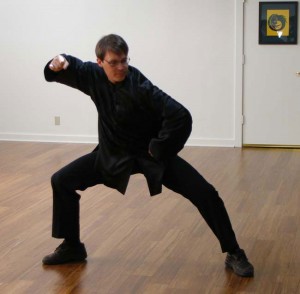Hunyuan Taiji System
The primary martial art and health cultivation practice that Matthew Sieradski teaches is the Hunyuan Taiji system. All of our qigong sets are from this system, and the system has greatly influenced our practice of Baguazhang as well.
Chen-style Xinyi Hunyuan Taiji Quan
The Chen-style Xinyi Hunyuan Taiji Quan system (abbrev. Hunyuan Taiji) was developed by grandmaster Feng Zhiqiang and integrates Taoist internal training, qigong, Chen-style taiji quan, and xinyi quan (mind-intent boxing) into a comprehensive system. The Hunyuan Taiji system is set apart from other systems of taiji by its emphases on nourishing the body and the use of mind-intent as fundamental to successful practice. It is both extremely practical and rooted in deep insight into reality.
What is qi?
In the context of qigong, taiji, and Chinese medicine, qi is the vital energy of life. Qi is involved in all physiological processes, such as bodily movement, opening and closing of the pores, digestion, temperature regulation, sleeping and waking. Emotions are patterns of the movement or restriction of qi. Externally, the breath connects the body’s life energy with the environment. Internally, the inner vital energy – nei qi – circulates throughout the subtle channels in the body.
What is qigong?
Qigong is a general term for methods of practice utilizing qi. Many styles of qigong have been developed for a variety of purposes.
The methods taught at our Academy emphasize promoting health as a foundation, martial ability as a practical application and spiritual cultivation as a unifying principle. The foundation of each of these aspects is the recognition of stillness as the basis of all movement.
What are the benefits of qigong?
Consistent practice of qigong along with a balanced lifestyle nourishes vitality, promotes longevity, regulates appetite and weight, and improves sleep. Qigong also augments skill in the martial arts and meditation.
What is spiritual cultivation?
People want to be happy. This is an intuitive recognition of our potential as aware beings. Spiritual cultivation is the practice of happiness. In traditional religions, this begins by training the mind through cultivating the virtues of compassion and mindfulness. At our academy, we combine training the mind with nourishing the body. In this way we release blockages to manifesting our true nature as happiness— our spiritual heart — in bodily form. Though our Academy has no affiliation with any organized religion, we respect all of humanity’s spiritual ancestors.
What is Taiji Quan?
Taiji Quan (abbrev. Taiji) is a system of martial arts, health exercise and spiritual cultivation with its roots in Taoist principles. The basis of taiji practice is to cultivate qi to nourish the body. It is only through nourishing in this way that the profound benefits and skills of taiji are developed.
What are the benefits of taiji?
There are many benefits to proper practice of taiji. Benefits include improved overall health, relaxation, increased vitality, inner strength, poise, and balance. Taiji is very enjoyable to practice and beautiful to behold. Taiji is also a social exercise, and through training with our friends we come to understand more deeply the interconnection and mutual affinity that we all share.
What is the relationship between qigong and taiji?
Taiji is qigong and martial arts combined. A traditional proverb says: “Practice boxing (taiji) without practicing qigong, practice to old age and your storehouse will be empty” (i.e., you will have accomplished little.) To succeed at taiji it is necessary to practice qigong, for taiji is the practical application of qigong. Taiji is also called chang quan or continuous boxing. This quality of continuous circulation of the qi throughout the body for up to forty minutes during taiji form practice confers benefits different from qigong sets, which involve more stillness.
What is Bagua Zhang?
Bagua Zhang (abbrev. Bagua) is an internal system of martial arts similar to taiji quan. The hallmarks of bagua are its circular stepping and its marvelous development and utilization of special qualities of awareness both within and outside of the body. Bagua training develops footwork and lower body integration more rapidly than Taiji. Bagua is excellent cross-training for Taiji practitioners, but also stands alone as a complete internal art system.


